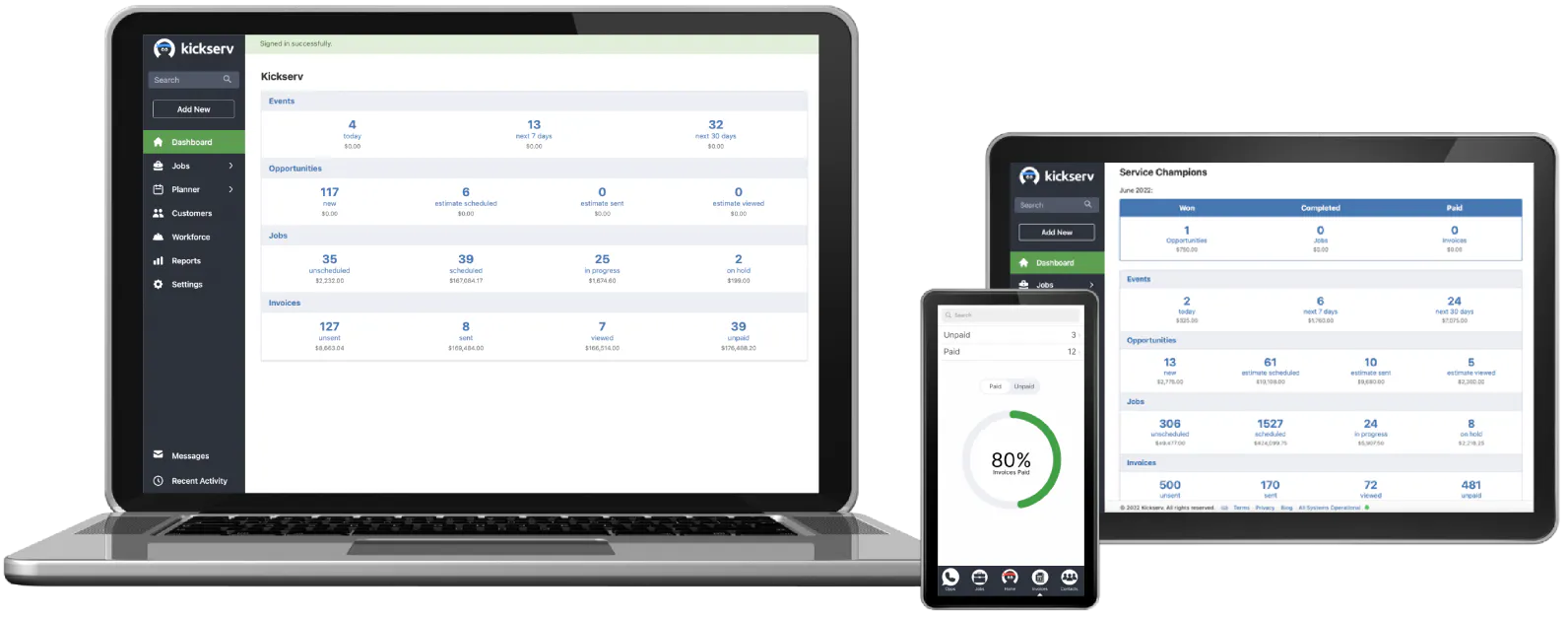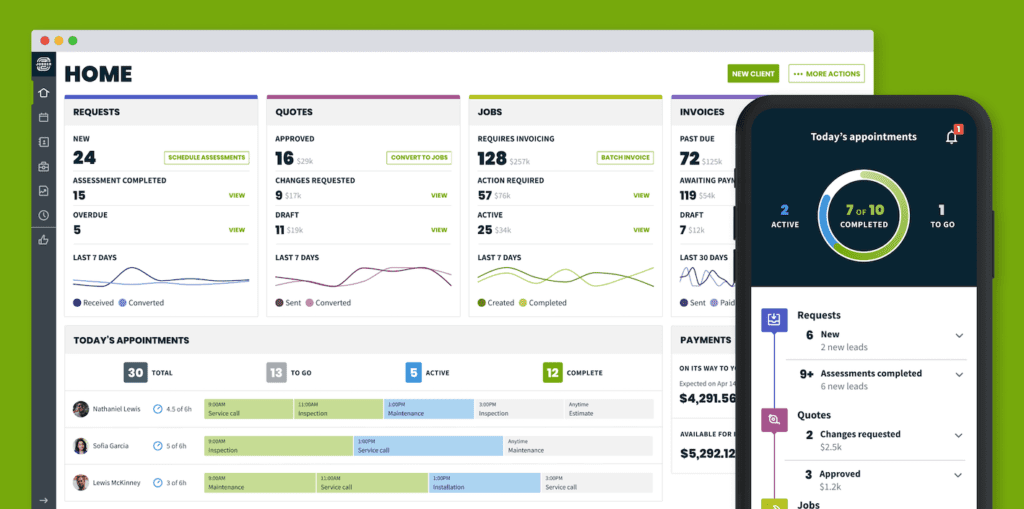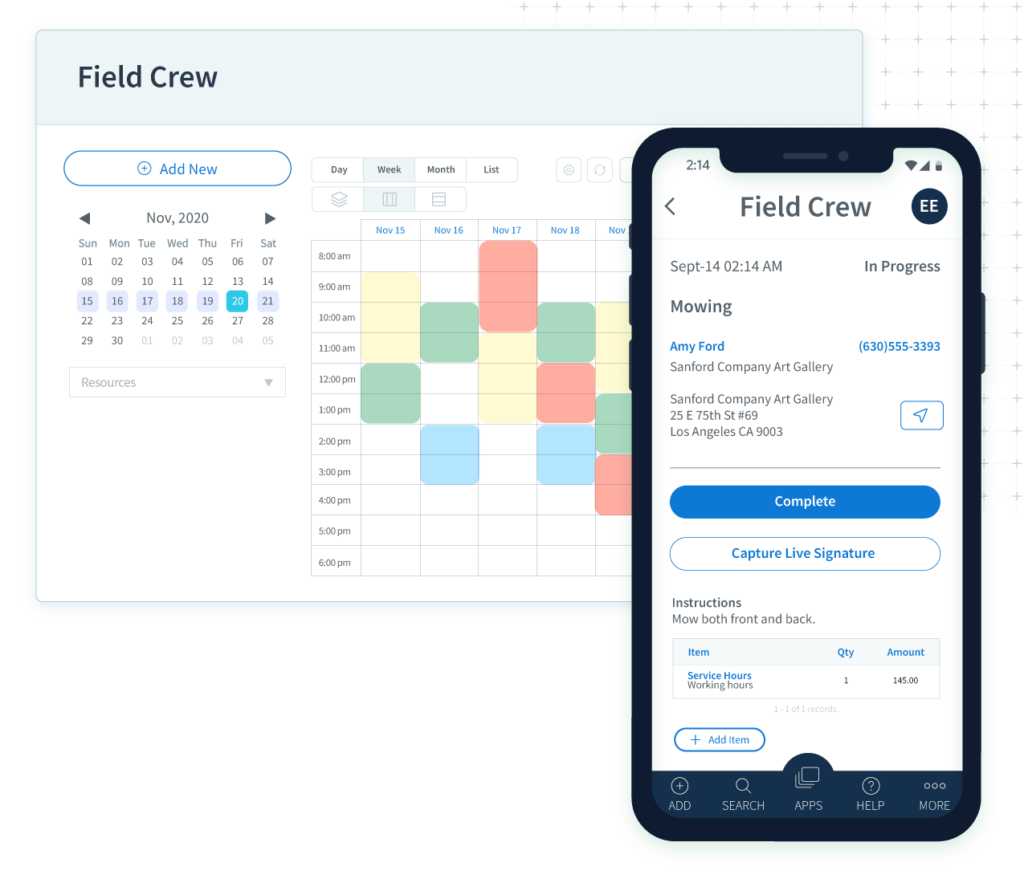There’s no doubt that selecting a field service management (FSM) software is a big decision. With so many options, finding the best choice becomes even more challenging.
In this blog, you’ll compare Kickserv vs. Jobber vs. Method to see which is best for your business.
You’ll tackle:
- Features of Kickserv vs. Jobber vs. Method.
- Why Method:Field Services stands out.
- How to make the right choice for your business.
Let’s jump in!
Overview of Kickserv vs. Jobber vs. Method
| The offering | Method:Field Services | Kickserv | Jobber |
| Real-time QuickBooks sync | ✓ | ✓ | ✕ |
| Job scheduling and dispatching | ✓ | ✓ | ✓ |
| Customer management | ✓ | ✓ | ✓ |
| Self-serve customer portals | ✓ | ✓ | ✓ |
| Unlimited DIY customization | ✓ | ✕ | ✕ |
| API accessibility | ✓ | ✓ | ✓ |
| Unlimited phone support | ✓ | ✕ | ✕ |
| Mobile app | ✓ | ✓ | ✓ |
| Zapier integration | ✓ | ✕ | ✓ |
| Mailchimp integration | ✓ | ✓ | ✓ |
| Google Calendar integration | ✓ | ✓ | ✓ |
| 14-day free trial | ✓ | ✓ | ✓ |
Background on field service businesses
Field service businesses specialize in on-site services such as:
- HVAC.
- Utility work.
- Automotive repairs.
- Construction projects.
For example, if you need to service your car or install a home appliance, you call a field service business. These experts rely on software like Kickserv, Jobber, and Method to streamline their operations in the field and at the office.
But when comparing Kickserv vs. Jobber vs. Method, which is better?
Overview of Kickserv

Image credit: Kickserv
To compare Kickserv vs. Jobber vs. Method effectively, let’s first highlight and analyze Kickserv.
Kickserv is a cloud-based software that coordinates field services for home maintenance businesses. It helps you:
- Monitor leads.
- Automate job scheduling.
- Facilitate payments.
- Coordinate quote and estimate creation.
Main features
Here are the key features of Kickserv:
- Task dispatching efficiency with drag-and-drop scheduling.
- Integration flexibility with QuickBooks.
- Automated invoicing system that’s compatible with text or email.
- Payment processing integration for digital transactions.
- User-friendly interface and customization options.
- Mobile accessibility, including iOS and Android apps.
- Time tracking efficiency with GPS navigation and real-time job updates.
Pros and cons
To evaluate Kickserv vs. Jobber vs. Method, let’s look at some pros and cons of Kickserv:
Pros
- Offers mobile accessibility.
- Provides seamless customer experience.
- Optimizes scheduling and streamlines workflows.
- Delivers comprehensive routing maps for technicians.
- Secures client data.
- Allows for real-time updates.
- Improves operational efficiency and enhances productivity.
Cons
- Not as customizable as other FSM software.
- Lacks designated marketing and promotion tools.
- No separation of leads and customers when managing contacts.
Pricing plans
- Free plan: Two users.
- Lite plan: $59 per month for up to five users.
- Standard plan: $119 per month for up to ten users.
- Business plan: $199 per month for up to twenty users.
- Premium plan: $299 per month for unlimited users.
Kickserv also offers an annual discount and a free trial for all plans.
Customer reviews
Kickserv garners positive reviews for its software — especially its routing capabilities and handy mobile app. However, users have faced challenges with editing estimates compared to other Kickserv alternatives like Workiz and Jobber.
Overview of Jobber

Image credit: Jobber
Next up in the Kickserv vs. Jobber vs. Method comparison is Jobber.
It’s a cloud-based software that keeps you organized at every job stage. Jobber lets you:
- Optimize routes.
- Manage schedules and job dispatching.
- Integrate with QuickBooks Online.
Main features
Jobber’s key features include:
- Seamless quote-to-job conversion.
- Efficient scheduling tools.
- Robust mobile app for on-the-go access.
- Real-time tracking capabilities with one-click route optimization.
- Batch sending for invoices.
- Automated reminders and payments.
- Client communication channels to manage contact details and agreements.
Pros and cons
Here are some Jobber pros and cons in the Kickserv vs. Jobber vs. Method comparison:
Pros
- Reliable customer support.
- Data security measures.
- Increased employee productivity.
- Easy task monitoring and management.
- Accurate and precise tracking of client records.
- Organization system that prioritizes tasks and assignments and categorizes service requests.
Cons
- High software price.
- Limited offline capabilities.
- Duplicating entries is tricky.
Pricing plans
- Grow plan: $245 per month
- Connect plan: $119 per month.
- Core plan: $49 per month.
Custom pricing is also available on request.
Customer reviews
Jobber’s reviews highlight its ease of use and solid job tracking. However, customers note additional costs and limited offline functionality compared to other alternatives like Service Fusion. Despite these issues, Jobber remains a popular choice for field service management.
Overview of Method:Field Services

Method:Field Services is the #1 field service management software for QuickBooks and Xero users. The platform’s two-way sync lets information flow automatically between your accounting software and Method.
Method lets you:
- Coordinate jobs and technicians.
- Customize features to your needs.
- Leverage multiple payment options to make collection easier.
- Administer estimates and invoices.
Main features
Here are the key features of Method:Field Services:
- Real-time job updates and route optimization.
- 360-degree view of crew members’ schedules.
- One-click conversion of estimates to invoices.
- Easy management of vendors and work orders.
- Customization options, like logo-branded transactions.
- Robust reporting features for analytics and insights.
What’s more, Method:Field Services also simplifies your customer interaction process. It provides you:
- Comprehensive CRM functionality.
- Seamless email management tools.
- Convenient integrations for mobile payments.
- Time-saving electronic signature capabilities.
Pros and cons
Here are some pros and cons of Method:Field Services:
Pros
- Excellent customer support quality.
- Helpful reusable templates.
- Synchronizes data across platforms.
- Monitors performance metrics and provides detailed analytics.
- Extensive workflow automation and service customization.
Cons
- Method:Field Services is currently only in English.
- The platform is suited for QuickBooks and Xero users.
Pricing plans
- Field Crew Technician: $15 per month.
- Dispatcher: $45 per month.
Method also offers a free trial with no commitment or credit card required.
Customer reviews
Method:Field Services receives high praise for its exceptional customer support. Users also appreciate how the software customizes service offerings and automates routine tasks. With over 1,400 5-star reviews on apps.com, the platform’s two-way sync with QuickBooks is another notable highlight. That said, while users find them valuable, some have noted that additional customizations are costly.
Kickserv vs. Jobber vs. Method:Field Services
Based on our observations, Kickserv vs. Jobber vs. Method differ in their approaches to:
- Customer management.
- Financial processes.
- Integrations.
Customer management
Kickserv: Boosts customer retention and repeat business as it manages client relationships. Its customer management features include:
- Centralized messaging for customers.
- Notifications for field service jobs.
- A customer center for scheduling, billing, and job tracking.
Jobber: Lets you easily access each customer’s contact details and communication history. It also includes:
- Two-way text messaging.
- Customizable text and email templates.
- Automated follow-ups for quotes, invoices, visits, and jobs.
Method:Field Services: Facilitates customer management with designated tools. It gives you a complete view of each customer and lets you:
- Access customer insights on the go.
- Manage customer relationships from your inbox.
- Enhance satisfaction with self-serve portals and automated follow-ups.
Job tracking
Kickserv: Enables efficient dispatching and real-time tracking with its GPS tools. Team members can also update job statuses instantly using their mobile devices.
Jobber: Automatically tracks time and expenses using location-based timers. It also calculates job profitability for accurate pricing and costing.
Method:Field Services: Logs time on work orders via the Time Tracking app. This ensures accurate billing and crew management.
Quoting
Kickserv: Lets you schedule and send estimates with ease. It also lets you convert estimates to jobs and schedule them based on location or technician skill set.
Jobber: Empowers professional quote creation for online approval. It also features automated reminders for outstanding quotes.
Method:Field Services: Lets you easily customize estimates. Once approved, you can quickly convert them into invoices.
Invoicing and payments
Kickserv: Lets you create and send invoices to your customers by text or email. It supports invoicing and billing digitally, as it lets you collect payments online or via credit card through Stripe.
Jobber: Easily generate and dispatch invoices directly to clients. The platform also supports multiple payment options, from online to credit card transactions.
Method:Field Services: Lets you create and personalize invoices from estimates or sales orders. It also facilitates online payments, including credit card processing.
Setup and integrations
Kickserv: Is known for its easy setup and open API for custom integrations. Kickserv syncs with:
- QuickBooks.
- Mailchimp.
- Google Calendar.
- Stripe.
- Outlook.
Jobber: Has a user-friendly setup and provides API access. It also integrates with:
- QuickBooks Online.
- Fleetsharp.
- Zapier.
- Mailchimp.
Method:Field Services: Offers API access and unlimited customization. It integrates seamlessly with:
- QuickBooks.
- Zapier.
- Google Calendar.
- Outlook.
- Mailchimp.
Additional features
Additional features are often the deciding factor between software options. Consider these extra functionalities:
Kickserv:
- 1-on-1 product support.
- Lead source tracking.
- Customizable SMS templates.
Jobber
- Community membership.
- Robust product support.
- Online tip collection features.
Method:Field Services
- Self-serve online portals.
- Business process automation.
- Data-driven reports and analytics.
- Free hour with a customization expert.
This is why it’s so important to consider all the details between Kickserv vs. Jobber vs. Method.
It’s also worth considering how these options fare in other comparisons, like Housecall Pro vs. Jobber vs. Method, to ensure you make the most informed decision.
How does Method:Field Services stand out?
So what sets Method:Field Services apart in the Kickserv vs. Jobber vs. Method matchup?
For one, Method excels with its real-time, two-way sync with QuickBooks. It generates comprehensive reports with centralized data to improve your bottom line.
Method also personalizes user experience so it’s uniquely yours. It offers nearly endless customization, including a free consultation hour with a product expert.
And with Method’s strong CRM capabilities, you can manage customer relationships without missing a sales opportunity.
To sum up, Method offers a more personalized, adaptable, and customer-centric approach to field management.
Why is choosing field service management software necessary?
Field service management software simplifies various tasks, from creating quotes to scheduling jobs.
With field service management software, you’re able to:
- Optimize your resources.
- Automate workflows.
- Improve productivity.
- Enhance customer satisfaction.
After putting it to the test, using field service management software results in:
- Fewer errors.
- Reduced costs.
- Greater profits.
In a nutshell, field service management software is all about making your work easier and more effective.
How to choose the best field service management software
Choosing the right FSM solution involves more than just looking at the basics. Here are some things to consider:
Assess your business needs and goals
Start by identifying the challenges and goals of your company. Understanding these will help you determine which field service features are most important.
Opt for a solution that adapts to business needs and balances cost-effectiveness. This approach ensures you invest your money in a solution that’s just right.
Evaluate software features and capabilities
When picking a solution, focus on features and software categories that are crucial for your business. Look out for:
- Efficient, real-time scheduling capabilities.
- Strong customer relationship management.
- Useful project management tools.
- Effective inventory management.
Consider software scalability and flexibility
Implement a solution that scales with business growth and offers scalability to business size.
As your needs evolve, flexibility becomes key. Look for software that navigates through intuitive interfaces and supports multi-user collaboration to grow with confidence.
Analyze integration with existing systems
Ensure your software integrates with other tools you already use, such as accounting software and CRM systems.
Focus on solutions that support cloud-based operations. This makes it easier to:
- Migrate data.
- Manage products.
- Update and upgrade software.
- Collaborate with team members.
Check for mobile accessibility and support
Opt for software that you can use away from your desktop. A mobile-friendly solution gives you more flexibility and accessibility to support your fieldwork. Your chosen platform should offer robust features for on-site tasks and let you easily configure workflows.
Additionally, make sure your software:
- Ensures regulatory compliance: Look for software that provides regulatory compliance support. This keeps you aligned with industry standards and legal requirements.
- Provides excellent customer service: Choose software backed by strong customer support to quickly address any issues and minimize downtime.
- Adapts to various devices: Ensure the software is compatible with a range of mobile devices, like your iPhone or tablet.
Read customer reviews and testimonials
Dive into customer reviews on sites like Software Advice to understand how the solution performs in real-life situations. For insights on its operational transparency, check out each option’s:
- User ratings.
- Product notes.
- Testimonials.
Key takeaways
When weighing Kickserv vs. Jobber vs. Method, it’s essential to recognize that each software serves unique business needs.
Kickserv offers easy job scheduling, payment facilitation, and lead monitoring. However, it falls short in customization and marketing tools.
Conversely, Jobber is known for its efficient scheduling tools and integrations with apps like Fleetsharp and Zapier. It excels in customer support but has limited offline capabilities.
Finally, Method:Field Services stands out with its two-way QuickBooks and Xero sync and comprehensive customization. Plus, its strong CRM features ensure that no opportunities slip through the cracks.
With the right software in your toolkit, you can tackle every job with newfound ease and confidence.
Kickserv vs. Jobber vs. Method: Frequently asked questions (FAQs)
Who should use Method:Field Services?
Method:Field Services is ideal for small-to-midsize businesses in search of a user-friendly platform with job management and CRM features. It’s a top pick for those who value integration with QuickBooks and rank customization as a priority.
Is field service management software suitable for small businesses?
Yes, field service management software is suitable for small businesses. It helps you:
- Organize operations.
- Manage customer interactions.
- Improve efficiency.
Can field service management software be integrated with other business systems?
Yes, field service management software can be integrated with other business systems, such as:
- Accounting software.
- CRM systems.
- Inventory management tools.
Note: While other software connects with e-commerce platforms, FSM software does not typically support e-commerce integration.
Get out of the office and back into the field with Method:Field Services.
Start your free trial today.
Image credit: Mikael Blomkvist via Pexels


